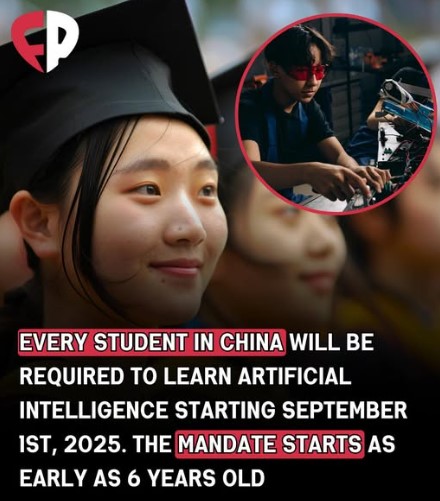China to Introduce Mandatory AI Education for All Students Starting at Age Six
Beijing, April 14, 2025 — In a bold and unprecedented move, China has announced that beginning September 1, 2025, Artificial Intelligence (AI) education will become a compulsory part of the national curriculum for all students—starting as early as six years old. The decision signals China’s intent to solidify its position as a global leader in AI development and innovation.
The policy, unveiled by the Ministry of Education, marks a historic shift in how technology is taught in schools. It will see AI concepts introduced at the primary school level and gradually expanded in depth and complexity throughout a student’s academic journey.

Early Exposure, Future Preparedness
Under the new curriculum, young learners will begin with foundational topics such as computational thinking, pattern recognition, and basic logic. As they progress through school, they will engage with more advanced subjects including machine learning, robotics, natural language processing, and data analysis.
Officials emphasized that the program is designed not only to teach technical skills but also to promote creativity, ethical thinking, and problem-solving—all of which are essential for thriving in the digital age.
“Equipping students with AI knowledge from an early age is a strategic investment in China’s future,” said a spokesperson for the Ministry of Education. “We are preparing a generation to innovate, lead, and shape the future of intelligent technology.”
A Global Vision for AI Leadership
This initiative is part of China’s broader national strategy to advance AI as a pillar of economic growth, scientific achievement, and international competitiveness. The country has already made significant investments in AI research, development, and infrastructure, and this educational reform represents the next phase of that long-term vision.
By integrating AI education across all school levels, China aims to develop a homegrown talent pipeline that will meet the growing demand for skilled professionals in emerging fields such as automation, smart manufacturing, health technology, and space exploration.
Implementation and Resources
To support the rollout, teacher training programs will begin this summer, and specially developed AI textbooks and digital learning platforms are being prepared in collaboration with leading universities and industry experts. The government will also provide additional funding for schools to acquire AI-related teaching tools and resources.
Pilot programs conducted over the past year in select provinces have shown strong engagement from students and educators alike, indicating high readiness for a national expansion.
Looking Ahead
As the global economy becomes increasingly reliant on artificial intelligence, China’s educational reform may set a precedent for other nations seeking to modernize their school systems. By starting early, the country is not only ensuring digital literacy but also cultivating a culture of innovation that could define the next generation of global tech leaders.
With this initiative, China takes a decisive step toward shaping its future—one classroom at a time.
